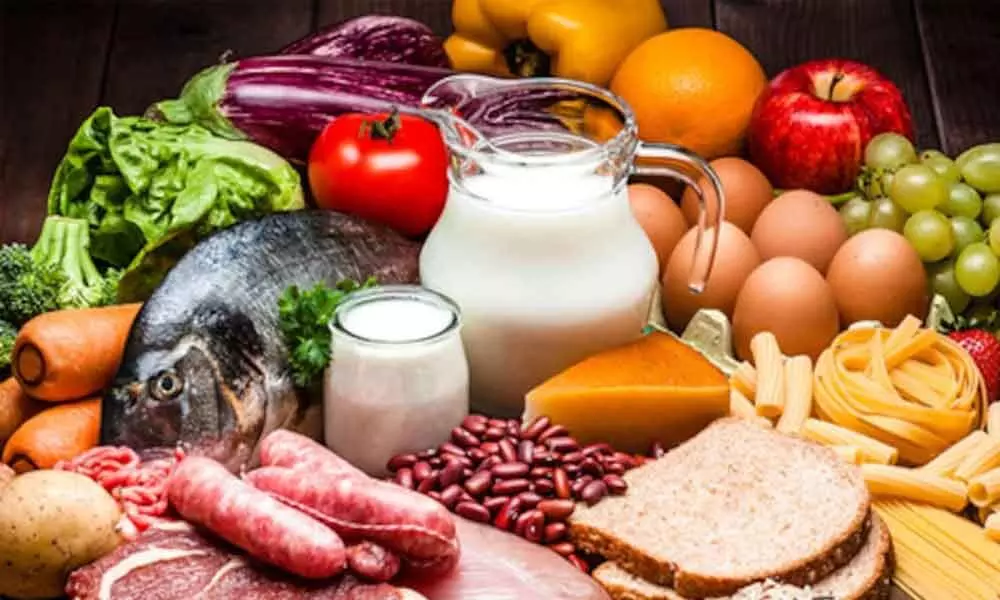Eating right is the secret to a long and healthy life
Improving your diet involves eating more whole foods (fruits, vegetables, legumes, poultry, fish, meat etc.), drinking more water and eating less ultra-processed foods
image for illustrative purpose

In India vegetarian is a huge phenomenon but non-vegetarian has its takers. It's becoming increasingly apparent that like most parts of nature, the best diet may be somewhere in between. Focus on doing the opposite of what most people do. First, fill your plate with half veggies, then use the space left for your carbs and protein. It's the 'work smarter not harder' method to our bodies.
Instead of attempting to never eat your favourite snacks, consider reducing your portions and eating them only a few times per week.
Improving your diet involves eating more whole foods (fruits, vegetables, legumes, poultry, fish, meat etc.), drinking more water and eating less ultra-processed foods. Some top foods to mix and match that support a healthy immune system: Berries (fresh, frozen or dried) especially for breakfast. Fermented foods like curds, yogurt which are easily available are good options. Spices (ginger, turmeric, cinnamon) can be used effectively to manage weight issues.
Cruciferous vegetables (broccoli, cabbage, Brussels sprouts, cabbage) are specially recommended but other vegetables like beetroot, carrots and beans are healthy too. Nuts and seeds (almonds, walnuts, sunflower seeds) can be used as toppings on salads. The importance of fruits have been well documented especially citrus fruits (oranges, lemons, lime, grapefruits, kiwis).
Instead of allowing feelings of sadness and deprivation to control you because you can't indulge in the quantity of ultra-processed foods and habits you are used to, celebrate being able to eat a variety of brightly coloured fruits and vegetables, legumes, poultry, fish, and meat that will nourish and keep your body functioning optimally.
If you want to enjoy ultra-processed foods occasionally, you could remove them from your home and only buy single-serve portions when you're out. Alternatively, decide how many portions you'd like to have during the week and buy only that quantity.
Improving your diet involves eating more whole foods (fruits, vegetables, legumes, poultry, fish, meat etc.), drinking more water and eating less ultra-processed foods. If your diet has included plenty of ultra-processed foods, reducing the amount you eat will be challenging. And if your mind is not set up favourably, you will feel deprived and eventually give up on your goals.
Making any type of change starts with your mind. If your mindset is not geared towards success, a.k.a, committed and dedicated, you will give up as soon as challenges arise or once you become uncomfortable.
Make a list of all the produce, including fruits, vegetables, nuts and seeds, poultry, legumes, and fish you enjoy eating. Each week decide on the meals and snacks you'd like to eat and stock your kitchen with all the ingredients you need to make them.
As you change your diet, you will discover strategies that work for you, the foods you enjoy and how they make you feel. Tracking creates accountability, boosts your morale, and will help you maintain your momentum.
We all know how difficult it can be to stay on track during the week! But the healthiest eaters among us eat that way because they prepare ahead of time. When there's a pre-made wrap in front of us, it's much easier to chow down on it, than if we know we have to put it together.
Find one meal or snack that you want to replace and do it, consistently. After a month of one healthy meal, move on to the next. If you gradually build, your healthy habits will be here to stay.
Drinking smarter is one way to reduce consuming the many calories in alcohol. Soda, alcohol, and creamy coffee offer empty calories with no nutrient benefit. So opt for green tea, herbal tea, or coffee with one simple additive. Need to drink more water? Drink a glass of water before every meal. Not only will you be less hungry, but it ensures that no matter what, you're drinking three glasses of water a day.
Canned, bottled, or freshly made, alcohol-free alternatives are growing in popularity and availability. With a complex taste, and some tasting similar to classic cocktails - they're a great option for those looking for something more than a seltzer and splash of juice. With people cutting back or eliminating alcohol altogether these creative alternatives create a comfortable option whether you're in a restaurant, bar, or at home.
These are almost always insightful pieces that leave you evaluating your own health. Whether you agree with certain diets or not, they usually provide ideas that make you think and keep you wanting to create your healthiest future.

